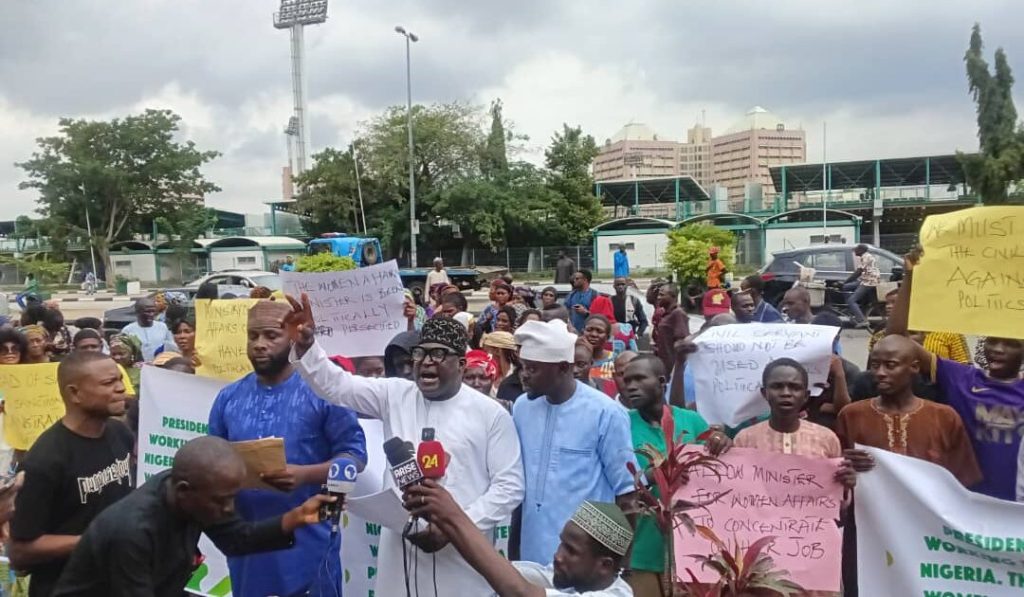The recent protest in Abuja, where scores of demonstrators marched from the National Assembly to the Office of the Head of the Civil Service of the Federation, highlights the escalating tensions between civil servants and political appointees within the Nigerian government. The demonstrators, a coalition of human rights activists, civil society organizations, and concerned citizens, voiced their strong disapproval of what they perceived as the harassment of the Minister of Women’s Affairs, Imaan Sulaiman-Ibrahim, by ministry staff. This incident, stemming from a protest by ministry workers over alleged neglect and poor welfare conditions, underscores the broader challenges facing the Tinubu administration as it navigates demands for improved working conditions and greater accountability within government ministries and agencies.
The crux of the demonstrators’ grievance lies in the September 10th incident where staff of the Federal Ministry of Women’s Affairs locked out Minister Sulaiman-Ibrahim from her office. The workers, numbering in the hundreds, barricaded the ministry gates, chanted slogans, and demanded her removal. This act, according to the protesters, constituted an unacceptable affront to constituted authority and a dangerous precedent for challenging the hierarchy within the government structure. They argued that civil servants do not have the right to challenge a minister’s authority, emphasizing the importance of respecting the established chain of command. The protesters viewed the workers’ actions as not only disrespectful but also politically motivated, suggesting a deeper, more orchestrated campaign to undermine the minister’s position and reputation.
Emmanuel Lawal, Director of Public Enlightenment at the Centre for Accountability and Public Engagement, articulated the protesters’ concerns, highlighting what he perceived as a sinister plot to discredit Minister Sulaiman-Ibrahim. He alluded to forces both within her home state of Nasarawa and at the federal level working to undermine her authority and tarnish her image. Lawal condemned the incitement of civil servants to protest against the minister, describing it as an embarrassment to the Nigerian government. He maintained that the minister had a proven track record of service, citing her previous roles as Director General of the National Agency for the Prohibition of Trafficking in Persons, Federal Commissioner of the National Commission for Refugees, Migrants and Internally Displaced Persons, and Minister of State (Police Affairs).
Lawal’s assertion of a concerted effort to damage the minister’s reputation suggests a deeper political undercurrent to the situation. He expressed concern about a “grand plot” to castigate and publicly humiliate the minister, aiming to destroy her hard-earned reputation and unblemished record of service. This allegation of a targeted campaign raises questions about the motivations behind the workers’ protest and the potential involvement of external actors seeking to destabilize the ministry or the government more broadly. The call for President Bola Tinubu to intervene and address the situation underscores the seriousness of the allegations and the need for a thorough investigation to uncover the truth.
The incident involving Minister Sulaiman-Ibrahim is not an isolated event but rather a symptom of a broader tension between civil servants and political appointees within the Nigerian government. This tension is often exacerbated by issues of welfare, working conditions, and the allocation of resources. Civil servants, who form the backbone of the government bureaucracy, often feel undervalued and underpaid, leading to resentment towards political appointees who are perceived as enjoying greater privileges and influence. This disparity in treatment can create a breeding ground for discontent and fuel protests, as seen in the case of the Ministry of Women’s Affairs.
The Tinubu administration now faces the challenge of addressing the underlying grievances of civil servants while also maintaining the authority and effectiveness of its political appointees. Balancing these competing interests is crucial for ensuring the smooth functioning of government operations and preventing further escalation of tensions. A failure to address the root causes of these conflicts could lead to more disruptions, undermining the government’s ability to deliver essential services to the Nigerian people. The protest serves as a wake-up call for the administration to prioritize dialogue and implement policies that promote a more harmonious and productive relationship between civil servants and political appointees.














